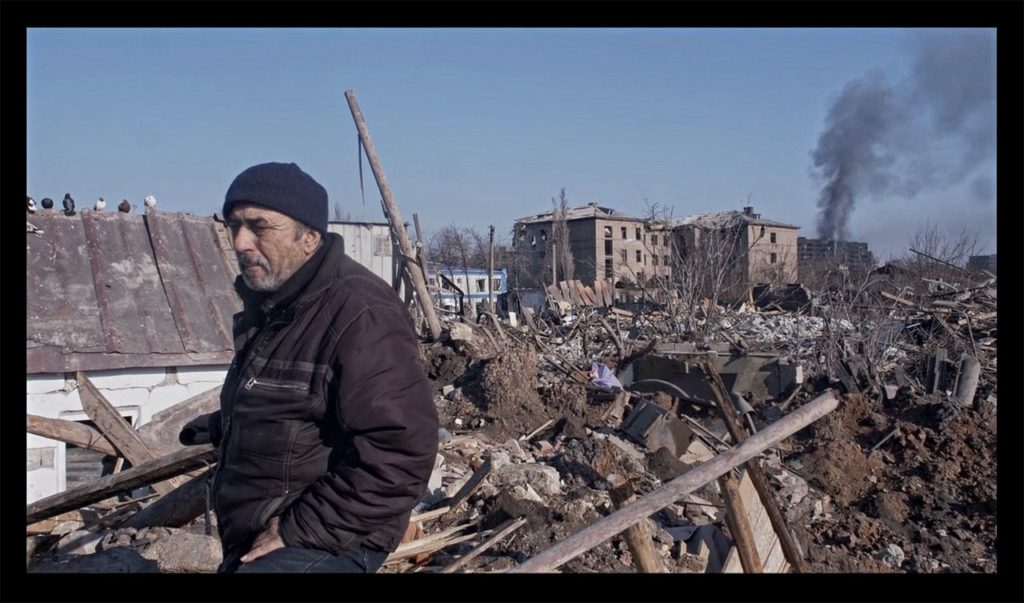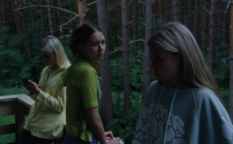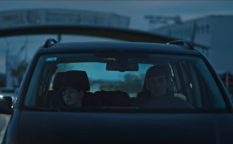Karlovy Vary review: Mariuopolis 2 (2022)

The Lithuanian filmmaker Mantas Kvaderavičius was captured and killed by the Russian forces in Mariupol on March 30th. He was 46. In his career, he directed two documentaries and one fiction feature. He was killed filming his fourth film, Mariupolis 2.
Back in 2016, Kvaderavičius completed his second documentary, Mariupolis, in which he portrayed the titular city in the east of Ukraine during the first stage of war in Donbas. The film was not something someone would expect from a war documentary, since Kvaderavičius focused more on life that goes on even during the war and despite it. In the late February or early March 2022, he decided to go back to the city, to try to repeat the same thing. But the war changed, it became more brutal and Mariupol was the focal point of it, at least in the early stage of the Russian invasion on Ukraine.
The Lithuanian filmmaker died a hero’s death on the line of his artistic and documentarian duty. The film, finished by his fiancée Hanna Bilobrova and his long-term editor collaborator Dounia Sichov, world-premiered at this year’s Cannes. The extended tour over the festival circuit should be expected, based both on the shocking level of the news of his death and on the fact that the war in Ukraine is the principal topic in media worldwide.
If it is considered to be a sequel, Mariupolis 2 would probably be the darkest one yet. The first Mariupolis was a noble effort of celebrating life and keeping the humanity under the distress of the war, while it also offered a bit of the geography of a pretty unique, multi-faceted city. The second one feels confined, for a good reason: the guns are bigger, and total destruction is getting nearer and nearer. Mariupolis 2 almost entirely takes place in and near the Baptist Church in a residential area of the town, its basement and immediate surroundings of maybe the next couple of streets in each direction. The church, or more precisely its basement, served as the shelter for a number of civilians, including Kvaderavičius whom we don’t see, but can hear occasionally.
His intentions were the same, at least at first, like with his previous Mariupolis movie. We can hear the thundering noise of shelling and bombing, sometimes further away, sometimes closer, and we can see the consequences of destruction, turning the city blocks in the piles of rubble. We even get to see a couple of corpses, but Kvaderavičius is more interested in living people trying not to get killed while they do the once ordinary things like getting water, cooking food, caring for the children, the elderly and the pets, burying their dead neighbours and even strangers, or accommodating to the reality of war by scavenging and salvaging the equipment after the dead.
That normalization is actually scarier than all the bombing and shelling that caused it, and all the scary stories witnessed and heard, because it implies that the façade of the civilization is very thin and it would be shed in the times of distress when the imperative is the most basic of survival. People Kvaderavičius portrays do their best to keep themselves together, individually and as a collective, to whether the storm, but it can only get darker. Another interesting implication could be associated with the religion: at one point, one of the church’s personnel “preaches” the theory that they survived thanks to the protection from God himself, unlike those people (and many children among them) in the bombed theatre, only to inform the inhabitants in the basement near the end of the film that the church will be closing its doors, so it could not provide shelter to them any more. One could ask where is God now?
In the end, the fact is that with the runtime of 112 minutes, Mariupolis 2 feels slightly overlong, and more assembled than properly edited to give a sense of rounded-up structure. Most of the material would end up out of the movie, the remainder of it would be edited into a short. As a feature-length documentary, it feels rushed and unfinished, because it actually is. On the other hand, there is a convincing reason for such thing: its urgency that could not get more right-here-right-now than it already got. Mariupolis 2 might nor be the strongest testament of Kvaderavičius’ filmmaking, but it is a testament of his humanity and the strength of his belief in his mission, and it also is a devastating testimony of the dark times we live in.
Runtime: 112’
Countries: Lithuania, France, Germany
Languages: Ukrainian, Russian
Ditected by: Mantas Kvaderavičius
Cinematography by: Mantas Kvaderavičius
Editing by: Dounia Sichov
Produced by: Uljana Kim, Mantas Kvaderavičius, Nadia Turincev
Production companies: Studio Uljana Kim, Extimacy Films, Easy Riders Films, Twenty Twenty Vision
Sales by: The Match Factory
















